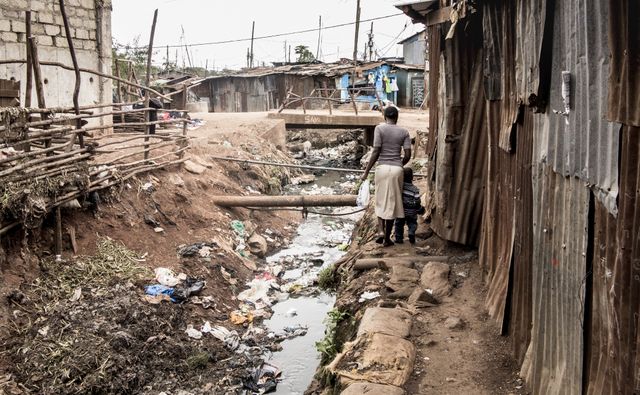5.1.1
Accommodation in Whitechapel
Features of General Housing in Whitechapel
Features of General Housing in Whitechapel
The area of Whitechapel was an over-crowded, over-populated, chaotic area of London.


Temporary homes
Temporary homes
- The majority of people had no permanent homes.
- There were whole families in one room which was paid for on a weekly basis.


Slum living
Slum living
- Most accommodation was considered to be ‘slum living’.
- There would be multiple families living in one building.
- They would share facilities like running water and toilets between them.


Rookeries
Rookeries
- Many people lived in areas known as Rookeries, which were densely over-populated areas filled with lodging houses.


Crime in Whitechapel
Crime in Whitechapel
- The Whitechapel area was very much like a maze with lots of alleyways which enabled criminals to evade detection.
Features of the Workhouse, Casual Ward and the Doss House in Whitechapel
Features of the Workhouse, Casual Ward and the Doss House in Whitechapel
Life was extremely challenging for those who lived in Whitechapel. Some were forced to turn to the Workhouse, Casual Ward or the Doss House.


Resorting to the Workhouse
Resorting to the Workhouse
- The Workhouse was somewhere for those people that reached a point where they had no other options.
- Often these were elderly people that were unable to work any longer.
- You have to remember that there was no old age pension or benefits available.
- Families in the workhouse were separated on entry.
- Parents and children would not have been able to see each other often and husbands would also be separated from their wives.


Rules in the Workhouse
Rules in the Workhouse
- There were strict rules about what time you needed to get up, go to bed and what time you were allowed to eat.
- You were also expected to complete tasks in return for your board.


Resorting to the Casual Ward
Resorting to the Casual Ward
- The Casual Ward worked slightly differently.
- This was somewhere you could go for the night if you did not have the funds for a Doss House.
- You would enter the Casual Ward along with around 400 others for the night.


Arriving at the Casual Ward
Arriving at the Casual Ward
- Upon arrival, you would be expected to wash and change.
- You would also be fed a nasty gruel like porridge with stale bread.
- Then you could sleep for the night.


Staying in the Casual Ward
Staying in the Casual Ward
- The day after your arrival, you would be expected to work for what you have already received.
- This would be hard labour:
- For example, oakum picking (picking apart the fibres of old ropes) was a popular task.
- Alternatively, you could be asked to work in the infirmary or the kitchens for the day.
- After a further night of sleep, you would be let out in the morning so you could find work for the day.


The Doss House
The Doss House
- This was a place where you could obtain a bed for the night, but for a fee.
- Usually, 4d would secure you a straw mattress in a coffin-like bed for the evening.
- If you were unable to meet the 4d charge you could pay a lesser figure and sleep on the ropes for the night.
- This meant you were effectively held up by a rope so you did not fall onto the floor.
- Your other option was a night on the cold dangerous streets of Whitechapel.
1Medieval England, 1000-1500
1.1Changing Definition of Crime in Medieval England
1.2Nature of Law Enforcement & Punishment
1.3Case Studies From 1000-1500
2Early Modern England, 1500-1700
2.1Changing Definitions of Crime
2.2Nature of Law Enforcement & Punishment
318th & 19th Century Britain
3.1Changing Definition of Crime in Industrial Britain
3.2Nature of Law Enforcement & Punishment
4Modern Britain, 1900-Present
4.1Changing Definition of Crime in Modern Britain
4.2Nature of Law Enforcement & Punishment
5Whitechapel Local Study
5.1The Geographical Area & Living Conditions
5.2The People of Whitechapel
5.3Policing in Whitechapel
5.3.1The Police Force in Whitechapel
5.3.2Jack the Ripper
5.3.3Challenges Facing the Police
5.3.4End of Topic Test - Policing in Whitechapel
5.3.5Grade 9 - Policing Whitechapel
5.3.6Diagnostic Misconceptions - Professional Police
5.3.7Diagnostic Misconceptions - Jack the Ripper
5.3.8Diagnostic Misconceptions - Vigilance Committee
5.3.9Diagnostic Misconceptions - Rundown Whitechapel
Jump to other topics
1Medieval England, 1000-1500
1.1Changing Definition of Crime in Medieval England
1.2Nature of Law Enforcement & Punishment
1.3Case Studies From 1000-1500
2Early Modern England, 1500-1700
2.1Changing Definitions of Crime
2.2Nature of Law Enforcement & Punishment
318th & 19th Century Britain
3.1Changing Definition of Crime in Industrial Britain
3.2Nature of Law Enforcement & Punishment
4Modern Britain, 1900-Present
4.1Changing Definition of Crime in Modern Britain
4.2Nature of Law Enforcement & Punishment
5Whitechapel Local Study
5.1The Geographical Area & Living Conditions
5.2The People of Whitechapel
5.3Policing in Whitechapel
5.3.1The Police Force in Whitechapel
5.3.2Jack the Ripper
5.3.3Challenges Facing the Police
5.3.4End of Topic Test - Policing in Whitechapel
5.3.5Grade 9 - Policing Whitechapel
5.3.6Diagnostic Misconceptions - Professional Police
5.3.7Diagnostic Misconceptions - Jack the Ripper
5.3.8Diagnostic Misconceptions - Vigilance Committee
5.3.9Diagnostic Misconceptions - Rundown Whitechapel
Unlock your full potential with Seneca Premium
Unlimited access to 10,000+ open-ended exam questions
Mini-mock exams based on your study history
Unlock 800+ premium courses & e-books